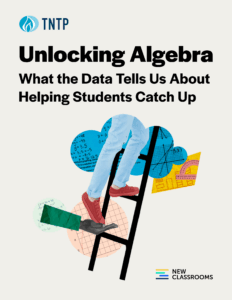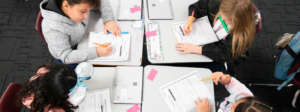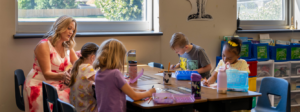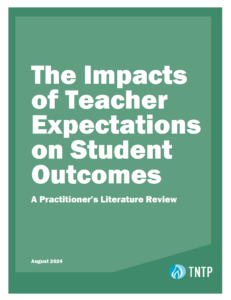Part I: Adapting Open-Source Materials for the Massachusetts Context
In July 2020, the Tennessee Department of Education released a free resource to support kindergarten through second-grade teachers in delivering early literacy instruction. Known as the Tennessee Foundational Skills Curriculum Supplement (TNFSCS), the program uses a systematic and explicit approach to teaching young children the essential building blocks of literacy. To help teachers in Tennessee meet the requirements for professional training in foundational literacy skills under the Tennessee Literacy Success Act, TNTP partnered with the Tennessee Department of Education to design and deliver the required training for more than 13,000 pre-K to fifth grade teachers.
Meanwhile, in Massachusetts, the Department of Elementary and Secondary Education (DESE) had identified a shortage of curricular resources for instruction in foundational literacy skills that were comprehensively aligned to the English Language Arts and Literacy Curriculum Frameworks, and that reflected the evidence-based practices outlined in Mass Literacy, the state’s vision for excellent early literacy instruction.
In partnership with TNTP, DESE set out to investigate whether the Tennessee materials could be adopted and adapted to meet the needs of the students and educators of Massachusetts. They launched a pilot with a small group of teachers across the state during the 2021-22 school year. Their overall goal was to understand the quality and usability of the materials, while also participating in professional learning, coaching, and providing feedback throughout the year.
Maggie Koelbl, TNTP Director, connected with Donna Goldstein, ELA/Literacy Content Support Lead, DESE, to talk about how they came to collaborate on adapting and adopting a similar set of open-source materials for Massachusetts.
Maggie: How did the Appleseeds program take shape in Massachusetts? What inspired DESE to partner with TNTP?
Donna Goldstein, DESE: Well, the story behind Appleseeds and our partnership with TNTP, like many stories, began with a compelling need. In the Massachusetts school system today, some of our children receive the instruction and support they need to develop a strong foundation for literacy — and some don’t. Only about half of Massachusetts third graders today are meeting literacy expectations. Our education system has particularly marginalized and failed to serve Black and Hispanic/Latino students. Massachusetts data suggests that our system supports fewer than 38% of Black and Hispanic/Latino students to meet literacy expectations by third grade. These statistics reflect not student effort or ability, but opportunity and support to learn. To achieve equity, we know that every student in our schools must receive the high-quality curriculum and evidence-based instruction they need and deserve. To begin to solve for this inequity, narrow opportunity gaps, and accelerate student learning at scale, DESE, in partnership with TNTP, developed Appleseeds: Evidence-Based Foundational Skills for Massachusetts to be available as an open-source resource that is free and available to anyone.
Maggie: Tell us a bit about Appleseeds – how it was developed?
Donna: Appleseeds is rooted in the Tennessee Foundational Skills Curriculum Supplement (TNFSCS). At DESE we recognized that the TNFSCS had the potential to be an excellent resource for MA schools and districts in search of strong foundational skills materials. In the spring of 2021, we partnered with TNTP, who had a lot of experience with the Tennessee materials and evidence-based, equity-driven literacy instruction, to see if we could adapt and develop our own version for Massachusetts.
Throughout the 2021-22 school year, teachers implemented the materials, participated in professional learning and coaching opportunities, and provided formal and informal feedback along the way. Then, in April of 2022, after triangulating the data from the pilot, as well as data from an external, objective foundational skills content expert and EdReports (a national non-profit that evaluates the quality of curriculum materials), DESE made the decision to adopt and adapt the TNFSCS materials for the Massachusetts context. We updated the materials as “Appleseeds: Evidence-Based Foundational Skills for Massachusetts” and made them publicly available in the fall of 2022! It was a long, thoughtful, and very deliberate effort.
Maggie: Why does DESE believe it is so important for school districts to shift to high-quality instructional materials rooted in evidence-based instructional practices?
Donna: First and foremost, DESE believes in this because DESE believes in our students. The data around stagnant literacy achievement is clear and longstanding, and the evidence base is equally clear and longstanding on what has been proven to work for all students to develop solid literacy skills. High-quality instructional materials rooted in evidence-based instructional practices are a big lever in changing the trajectory of student learning experiences and literacy outcomes by ensuring greater access to strong instruction for all students. Teachers want to do the best for their students, and we need to support our teachers in doing that work. Our teachers deserve access to the best tools for the job; the highest quality curricular materials should be in their hands, and they should be supported to use them, skillfully and responsively, for the students in front of them. You wouldn’t ask a pastry chef to bake without a whisk and spatula, but that’s what we’re asking our teachers to do when we withhold strong curricular materials. An expertly crafted curriculum is the starting point for teachers to provide personalized, evidence-based, and culturally responsive instruction. High-quality instructional materials – along with high-quality implementation supports – can do this.
Maggie: What has been your biggest take-away from the Appleseeds work thus far?
Donna: The biggest takeaway is that implementing high-quality instructional materials is actually a very long game that requires lots of supported practice, professional learning time, and collaboration for teachers and administrators. Teachers and literacy leaders need space to deeply understand the purpose and carefully orchestrated interplay of the instructional routines and lesson sequences and then to practice them and feel comfortable with them. This has not always been the case in education. We have tended to approach new curricula like a “one and done” – just drop it off and that task is checked. The research has shown us – and I have witnessed – that this kind of a “task approach” to implementation just undermines the whole effort.
I used to think that getting high-quality materials was the halfway point in the process and that implementation was the other half. I am honestly thinking now that getting the new, high-quality instructional materials is really just the first step, or at most, the 25% mark! Once you have decided upon the materials you have just begun the real – and really exciting – work of strengthening instruction for all.
In Part II of this three-blog series, we will hear from several teachers and school leaders from the school district in Clinton, MA who participated in the small-group pilot of the materials in 2021; in the 2022-23 school year, they have expanded the implementation to all K-2 teachers. In Part III, we’ll also hear from teachers and school and district leaders from Monson Public Schools, another district that is implementing the materials with all K-2 teachers this school year.








